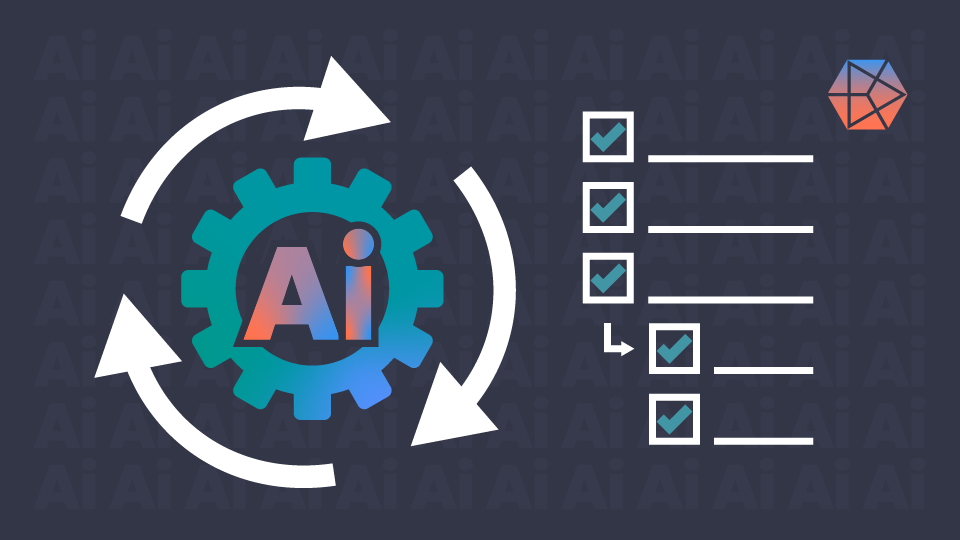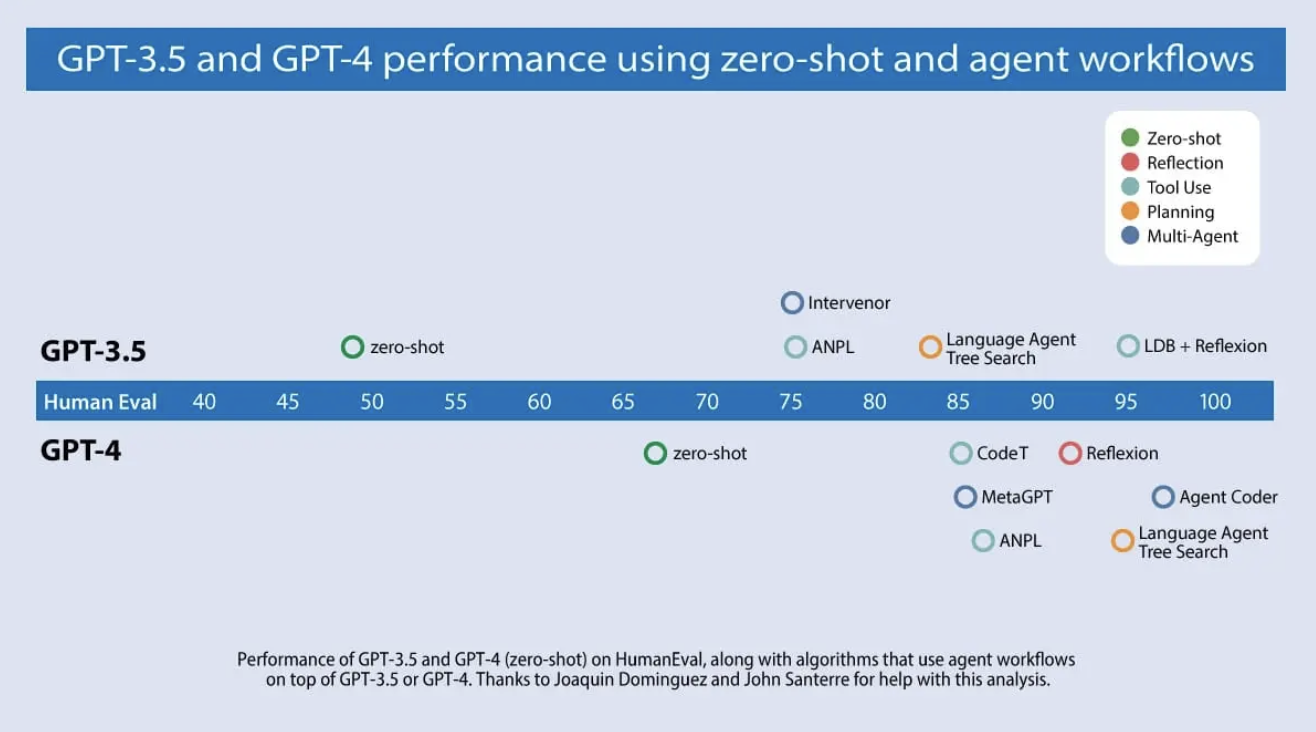
The emergence of generative AI heralded disruptive change for businesses two years ago, and now agentic AI is poised to build on its capabilities to further bring change to the enterprise.
Agentic AI, AI agents, or agent-based workflows involve giving AI agents autonomy to complete more complex tasks. While most generative AI involves singular prompts and responses, agentic AI for enterprises can take initiative, plan multiple steps, problem-solve, learn, and adapt.
Leaders in the AI space are all investing heavily in agentic. In January, OpenAI introduced a research preview of Operator, their AI agent that can perform browser tasks such as ordering groceries, buying tickets, or filling out forms. Google’s Project Mariner, Microsoft Copilot, and Amazon Nova Act all represent major advancements toward an agentic AI future. IBM found that 99% of enterprise AI developers are exploring AI agents.
While the term has become pervasive in conversations about AI, it’s worthwhile to take a step back and look at what exactly agentic AI is. How does Agentic AI integrate with existing enterprise systems? Should you rush to “make your AI agentic” right away, and if not, how should companies think about timing and preparation?
What Is Enterprise Agentic AI?
Agentic AI refers to AI systems with a degree of agency, allowing them to act autonomously to pursue specific goals or objectives. An AI agent is a software program that interacts with its environment, collects data, and autonomously performs tasks to achieve predefined goals. It makes rational decisions based on data, optimizing its actions to produce the best possible outcomes.
The main concept of agent-based workflows is to set goals for the AI agent and then allow it to go out and leverage the resources needed to achieve those goals.
Agentic AI is best understood as a philosophy for organizing data, infrastructure, and assigning tasks to AI. As Amazon points out, a more nuanced view of agentic systems is to consider the concept of “agentic” as a spectrum of agent-like qualities instead of viewing it as “traditional AI” vs agentic AI.
How Does Agentic AI Differ From Traditional AI?
One common misconception is that agentic AI will replace generative AI. In fact, agentic AI is simply one way to organize generative AI to make it more effective and do things that wouldn’t be possible with traditional generative AI.
The generative AI vs agentic AI discussion has gotten more complex with the introduction of reasoning models.
If you asked GPT-3 to write an essay, it would write the entire essay from start to finish with no revisions. New reasoning models such as GPT-o3, Claude 3.7 Sonnet, or Gemini 2.5 offer generative AI wrapped in an agentic workflow. These models have the ability to first outline the essay, identify and perform any necessary research, and then write a first draft.
Reasoning models can be thought of as an agentic system that relies on underlying models and data and are tasked with a mission to think through a problem in a way that may include multiple iterations where it “thinks through” intermediate outputs in order to go deeper into answering a prompt.
Andrew Ng, enterprise agentic AI leader and founder of DeepLearning.AI, recently presented his findings on agentic AI. Andrew Ng and his team found that using GPT 3.5 with an agentic workflow outperformed zero-shot GPT-4 by 10-40%.
However, this is just one small agentic AI use case that still relies on the familiar prompt-based generative AI. The real promise comes when agents are given greater autonomy to start and complete multi-step tasks with minimal oversight. Multi-agent systems and tool-using agents that are given access to APIs, browsers, and databases have incredible potential.

What Are the Main Benefits of Using Agentic AI for Enterprise
The use of enterprise agentic platforms allows enterprises to give AI more expanded work. AI agents can take initiative, plan actions, and make decisions based on the goals of their task without needing as much human input. Giving agents the ability to utilize tools, access data, and work with other AI agents offers increased problem-solving capabilities.
It also creates new agentic AI use cases that can help transform your business:
- Customer Service: Beyond simple chatbots, customer service agents can offer more proactive support by detecting potential delivery delays, performing sentiment analysis to identify customer emotions, and maintaining context across multiple interactions.
- Sales Optimization: Agents can help optimize sales performance by dynamically adjusting sales strategies and prospecting efforts based on real-time market insights, customer interactions, and automated lead qualification.
- Operations: One of the areas with the most potential, agentic AI for enterprise operations can help optimize workflows, predict failures and bottlenecks, and manage routine administrative tasks.
- Project Management: Agentic AI can streamline development projects by dynamically allocating resources, automating RFI and proposal generation, and proactively identifying and mitigating risks.
These are just a few of the use cases for agentic AI in the enterprise. As AI agents become more sophisticated and access and governance measures are put into place, they can also be used in legal and compliance, cybersecurity, financial services, and more.
Practices for Governing Agentic AI for Enterprises
Given the benefits of agentic AI systems, your enterprise should immediately prioritize this AI opportunity, right? In doing so, it’s important to balance its potential with caution and consideration for prerequisites..
Even if your is already deeply invested in AI, your data, infrastructure, and AI culture may not be ready to adopt enterprise agentic AI.The degree of automation, reliance on tools, and reliance on defined goals can present challenges to even organizations which would be mature for other kinds of AI. However, there are steps you can take to begin governing agentic AI for enterprise use.
Prepare Workflows and Infrastructure
In general, AI shouldn’t work in isolation. It is best when it is tied into business processes. This is especially true for agentic AI in enterprises. The main promise of agentic AI is the ability for AI agents to use tools, collect data, and tie into existing workflows.
Google and NVIDIA have recently taken steps to address the critical need for enterprises to prepare their infrastructure for agentic AI. In April, NVIDIA announced Google Gemini agentic AI models will be available on premises through Google Distributed Cloud and NVIDIA Blackwell.
To implement principles of agentic AI in your enterprise, you need to look at how AI agents will tie into different sources of data and workflows within your enterprise. Agentic AI will need to interface with different systems that you already have in order to query info, request resources, and start the process. Any analog processes in your organization will be roadblocks.
Your entire organization needs to be more programmatically accessible to allow AI agents to be fully effective, and this includes dependencies on systems that may lie outside your core organization such as third party data sources and platforms.The need for greater system integrations, access control, and agent operations are the main reasons most enterprises aren’t ready for agentic AI workflows.
Is Your Enterprise Ready For Agentic AI?
Increase Data Readiness
Agentic AI for enterprise systems relies on high-quality, well-structured data to make decisions, learn, and act autonomously. The best thing you can do now to prepare for any artificial intelligence project is to create a comprehensive data strategy for collecting, managing, and utilizing data effectively.
All AI models are only as good as the data used to train them. Agentic AI needs more than good training data, it needs to be able to easily access and manipulate data as part of performing multi-step workflows. Your enterprise needs to look at how data will live across multiple contexts that your agents will interact with and ensure data is well-organized and managed so agents can operate most effectively.
Increasing data readiness for AI agents involves establishing clear permissions and metadata standards to support contextual data accessibility, implementing data governance measures, and ensuring compliance across agent interactions. It’s also critical to build resiliency into data handling so agents can seamlessly manage unexpected data needs without disrupting enterprise operations.
AI Governance and Operations
With all artificial intelligence implementations, there is a risk of overcomplicating things. Trying to jump straight to adopting agentic AI enterprise-wide runs the risk of creating a sorcerer’s apprentice situation. If your core AI isn’t built well, you may find it has run out of control and become very difficult to stop.
Large language models are particularly difficult to debug because they are non-deterministic - they may not give you the same answer when given the same prompt at different times. This problem is compounded when considering enterprise agentic AI use cases. When your enterprise has multiple agents processing hundreds or thousands of inputs and outputs, it can be difficult to troubleshoot when something goes wrong.
The answer is to be disciplined when implementing AI. Your enterprise should work towards building a robust AI governance and AI operations capability that is able to manage the complexity inherent in generative and agentic AI.
To start, Gigster recommends choosing a single business function, or 5-10% of the organization, to transform with an initial AI development project. Once that implementation has been fully adopted, you can move up in your AI maturity level and start to transform more of the business.
While agentic AI for enterprise is still in the early stages of adoption, you can expect it to dramatically expand the tasks that AI can do. As this technology evolves, users will need to get used to delegating tasks to AI agents and waiting for responses, much like assigning work to a human colleague.
If you’re interested in agentic AI for your enterprise, Gigster can help you find the right artificial intelligence development services to fit your needs. Our focus is on integrating AI into business processes to see the most impact and success from AI initiatives. Contact us today to learn more about our AI development teams.
